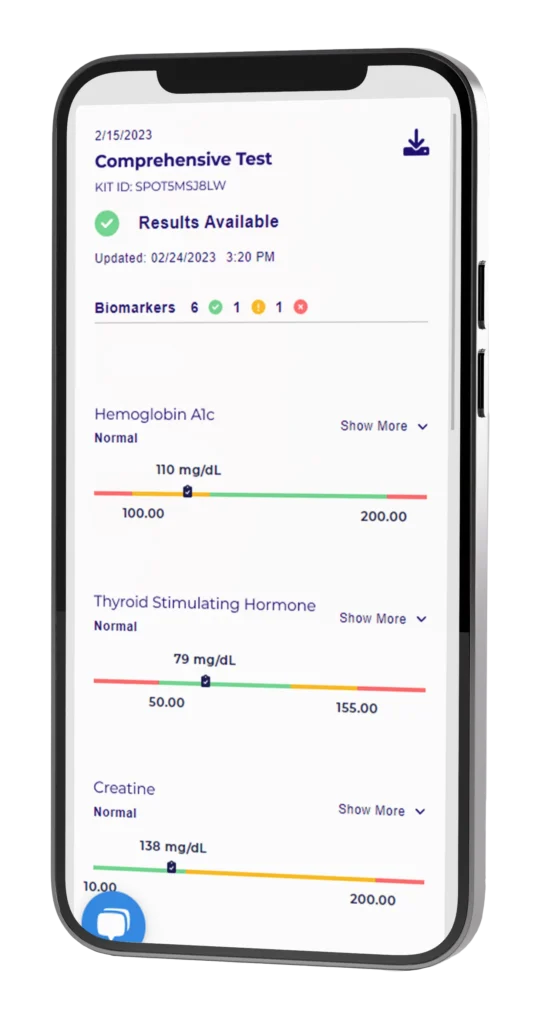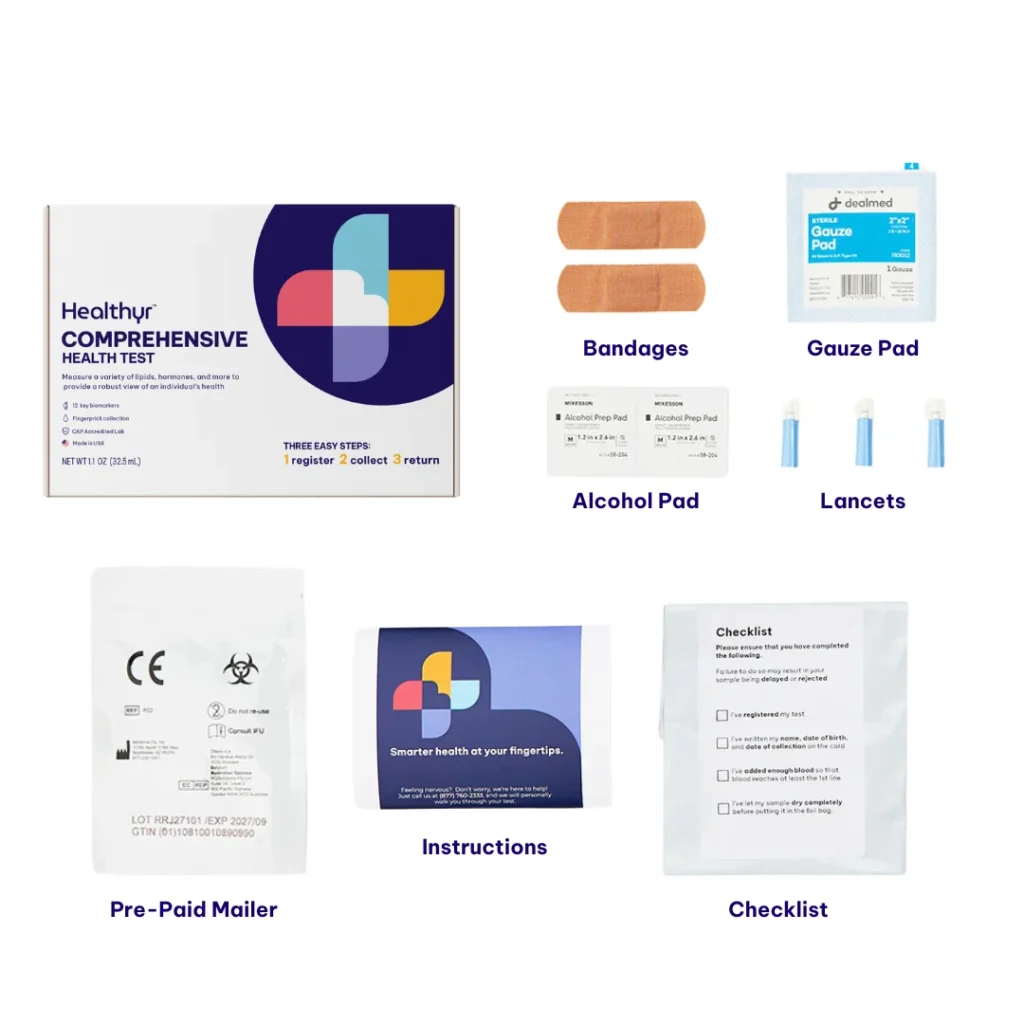Comprehensive Health Test
$164.99
Free Shipping
The Comprehensive Health test provides you with valuable insights into your heart health, blood sugar, kidney and liver function, hormone health, and more.
Not available in NY State.
Tests For:
Hemoglobin A1c (HbA1c), Thyroid-Stimulating Hormone (TSH), Creatinine, Cholesterol, High-Density Lipoproteins (HDL), Low-Density Lipoproteins (LDL), Cholesterol Ratio, Total Bilirubin, Alanine Transaminase (ALT), Aspartate Transaminase (AST), Vitamin D, Cortisol, and Triglycerides

Pay in 4 easy payments with PayPal Pay Later or Afterpay
- FSA/HSA Eligible
- For adults 18+
- Results in 7 days
- FSA/HSA Eligible
- For adults 18+
- Results in 7 days
Biomarkers tested
- Alanine Aminotransferase (ALT)
- Aspartate Aminotransferase (AST)
- Total Cholesterol
- Cortisol
- Creatinine
- Hemoglobin A1C (Hba1c)
- High-Density Lipoproteins (HDL)
- Low-Density Lipoproteins (LDL)
- Thyroid-Stimulating Hormone (TSH)
- Total Bilirubin
- Triglycerides
- Vitamin D
Alanine Aminotransferase (ALT)
ALT is an enzyme found mostly in liver cells. Liver damage caused by infection, injury, alcohol consumption, certain medications, or liver disease can cause an elevated amount of ALT in the blood stream. Measuring ALT and AST may help a care provider evaluate your overall liver health.
Aspartate Aminotransferase (AST)
AST is an enzyme found in the liver, heart, muscles, kidneys, brain, and red blood cells, which helps these tissues metabolize amino acids. AST levels in blood are most commonly used to evaluate liver health, but may also indicate tissue damage in the heart, muscles, kidneys, brain, or red blood cells.
Total Cholesterol
Cholesterol is a waxy, fat-like substance that’s found in all the cells in your body. Your body needs some cholesterol to make hormones, vitamin D, and substances that help you digest foods. However, if you have too much cholesterol in your blood it can combine with other substances in the blood to form plaque. Plaque sticks to the walls of your arteries, which can develop into atherosclerosis and lead to cardiovascular disease.
Cortisol
Cortisol affects several aspects of your body including regulating your stress response, immune system and inflammation, blood pressure, heart rate, glucose metabolism. Cortisol levels can impact your cardiovascular health, risk for diabetes, immune system, fertility, and even cognition.
Creatinine
Creatinine is a byproduct of normal muscle function that is filtered out of your blood by your kidneys and exits your body in urine. Diabetes can impair the kidneys’ ability to remove creatinine from blood. Measuring creatinine can help understand whether your kidneys are functioning properly.
Hemoglobin A1C (Hba1c)
A hemoglobin A1c (HbA1c) test measures the amount of sugar (glucose) attached to hemoglobin. This biomarker indicates your average blood sugar level over the past three months, which may be useful in identifying people suffering from diabetes or prediabetes. In people with known diabetes or prediabetes, HbA1c levels help indicate how well these conditions are being managed.
High-Density Lipoproteins (HDL)
Often referred to as “good cholesterol” HDL (high-density lipoprotein) is a type of cholesterol that is associated with better cardiovascular health. HDL helps clear unhealthy cholesterol, like LDL, out of your body. Understanding your HDL levels can help a care provider evaluate your cardiovascular health.
Low-Density Lipoproteins (LDL)
Often referred to as “bad cholesterol” LDL (low-density lipoprotein) is a form of cholesterol that may increase your risk of developing atherosclerosis, the most common cause of cardiovascular disease. Understanding your LDL levels can help a care provider evaluate your cardiovascular health.
Thyroid-Stimulating Hormone (TSH)
Thyroid-Stimulating Hormone, or TSH, is produced by the pituitary gland and regulates the production of thyroid hormones by the thyroid gland. TSH levels are affected by a number of factors, including stress, diet, and certain medications. An imbalance of TSH levels may indicate an underactive or overactive thyroid, which can cause fatigue and diminish your ability to effectively exercise.
Total Bilirubin
Bilirubin is a byproduct of the normal breakdown of red blood cells. This byproduct is processed by the liver, where it becomes incorporated into bile and eventually excreted from your body. The amount of bilirubin in your blood may be an indicator of your liver’s ability to filter your blood. This can help a care provider evaluate your overall liver function.
Triglycerides
If you eat more calories than you need, your body turns the extra calories into triglycerides and stores them in your fat cells to use later. A high blood triglyceride level usually doesn’t cause any symptoms, but over time it may affect your arteries and increase your risk of developing cardiovascular disease. Understanding your triglyceride levels can help a care provider evaluate your cardiovascular health.
Vitamin D
Vitamin D helps your body absorb calcium and regulates many other functions in your body, including inflammation, antioxidants, and neuroprotection. Healthy Vitamin D levels are associated with improved mental health, endurance, muscle function, and bone strength. High levels of physical activity in athletes may increase the body’s demand for Vitamin D.
Biomarkers tested
Hemoglobin A1c (HbA1c)
Thyroid-Stimulating Hormone (TSH)
Creatinine, Cholesterol
High-Density Lipoproteins (HDL)
Low-Density Lipoproteins (LDL)
Cholesterol Ratio
Total Bilirubin
Alanine Transaminase (ALT)
Aspartate Transaminase (AST)
Vitamin D
Cortisol
Triglycerides
What is it and how does it affect me?
ALT is an enzyme found mostly in liver cells. Liver damage caused by infection, injury, alcohol consumption, certain medications, or liver disease can cause an elevated amount of ALT in the blood stream. Measuring ALT and AST may help a care provider evaluate your overall liver health.
What is it and how does it affect me?
AST is an enzyme found in the liver, heart, muscles, kidneys, brain, and red blood cells, which helps these tissues metabolize amino acids. AST levels in blood are most commonly used to evaluate liver health, but may also indicate tissue damage in the heart, muscles, kidneys, brain, or red blood cells.
What is it and how does it affect me?
Cholesterol is a waxy, fat-like substance that’s found in all the cells in your body. Your body needs some cholesterol to make hormones, vitamin D, and substances that help you digest foods. However, if you have too much cholesterol in your blood it can combine with other substances in the blood to form plaque. Plaque sticks to the walls of your arteries, which can develop into atherosclerosis and lead to cardiovascular disease.
What is it and how does it affect me?
Cortisol affects several aspects of your body including regulating your stress response, immune system and inflammation, blood pressure, heart rate, glucose metabolism. Cortisol levels can impact your cardiovascular health, risk for diabetes, immune system, fertility, and even cognition.
What is it and how does it affect me?
Creatinine is a byproduct of normal muscle function that is filtered out of your blood by your kidneys and exits your body in urine. Diabetes can impair the kidneys’ ability to remove creatinine from blood. Measuring creatinine can help understand whether your kidneys are functioning properly.
What is it and how does it affect me?
A hemoglobin A1c (HbA1c) test measures the amount of sugar (glucose) attached to hemoglobin. This biomarker indicates your average blood sugar level over the past three months, which may be useful in identifying people suffering from diabetes or prediabetes. In people with known diabetes or prediabetes, HbA1c levels help indicate how well these conditions are being managed.
What is it and how does it affect me?
Often referred to as “good cholesterol” HDL (high-density lipoprotein) is a type of cholesterol that is associated with better cardiovascular health. HDL helps clear unhealthy cholesterol, like LDL, out of your body. Understanding your HDL levels can help a care provider evaluate your cardiovascular health.
What is it and how does it affect me?
Often referred to as “bad cholesterol” LDL (low-density lipoprotein) is a form of cholesterol that may increase your risk of developing atherosclerosis, the most common cause of cardiovascular disease. Understanding your LDL levels can help a care provider evaluate your cardiovascular health.
What is it and how does it affect me?
Thyroid-Stimulating Hormone, or TSH, is produced by the pituitary gland and regulates the production of thyroid hormones by the thyroid gland. TSH levels are affected by a number of factors, including stress, diet, and certain medications. An imbalance of TSH levels may indicate an underactive or overactive thyroid, which can cause fatigue and diminish your ability to effectively exercise.
What is it and how does it affect me?
Bilirubin is a byproduct of the normal breakdown of red blood cells. This byproduct is processed by the liver, where it becomes incorporated into bile and eventually excreted from your body. The amount of bilirubin in your blood may be an indicator of your liver’s ability to filter your blood. This can help a care provider evaluate your overall liver function.
What is it and how does it affect me?
If you eat more calories than you need, your body turns the extra calories into triglycerides and stores them in your fat cells to use later. A high blood triglyceride level usually doesn’t cause any symptoms, but over time it may affect your arteries and increase your risk of developing cardiovascular disease. Understanding your triglyceride levels can help a care provider evaluate your cardiovascular health.
What is it and how does it affect me?
Vitamin D helps your body absorb calcium and regulates many other functions in your body, including inflammation, antioxidants, and neuroprotection. Healthy Vitamin D levels are associated with improved mental health, endurance, muscle function, and bone strength. High levels of physical activity in athletes may increase the body’s demand for Vitamin D.
Results you can trust + understand
- At-home diagnostic test
- Easy finger prick collection
- Lab results within days
- Track your lab information all in one place
- Secure portal with personalized next steps




Your kit comes with everything you need to collect your sample
- Lancets
- Pre-paid Mailer
- Bandages
- Alcohol Pad
- Checklist
- Gauze Pad
- Instructions
- Takes just 15-20 minutes
- Discreet packaging
- CLIA Lab Certified
- Takes just 15-20 minutes
- Discreet packaging
- CLIA Lab Certified
How it works
Register
Register your test online using the unique ID number that comes with the kit.
Collect
Following the instructions provided, collect your sample – it’s fast and easy!
Return
Mail your sample to our lab using the prepaid envelope included in your test kit.
Results
Receive your private HIPAA compliant results to your Healthyr portal in 3 days!


Test Smarter, Not Harder
Healthyr uses microsampling technology to offer health tests that can be done in the comfort of your home. There is no need to visit a medical professional or lab– you collect your sample yourself using a simple finger prick.
This test is for you


If you are interested in becoming healthier but are not sure where to start.
The Comprehensive Health Test gives a high level overview of your health, testing biomarkers across a range of important systems such as heart health, liver and kidney function, hormones, and blood sugar. It’s a great starting point to get a baseline of your current health.


If you haven’t had bloodwork or been to the doctor in a while.
If you’ve experienced gaps in care, whether due to difficulty getting an appointment, limited access, living in a remote area, or any other reason, the Comprehensive Health Test is a great way to check up on your overall health. The insights can help you to take next steps towards better health.


If you have a family history of chronic conditions.
If you have a close relative (e.g. a parent, sibling, or grandparent) with a chronic condition such as diabetes or heart disease, the Comprehensive Health Test can be an invaluable tool to monitor your health and identify issues early.
About our labs and science
Accuracy
+
Reliability
Lab Safety
+
Sterility
Privacy
+
Security
Our tests use an accurate and reliable form of microsampling called Dried Blood Spot Testing. This form of testing has been used since the 1960s in Neonatal care and for testing in remote locations. You may be familiar with the heel prick performed on newborns during their initial health assessment– this is Dried Blood Spot Testing.
Our state-of-the-art lab is CLIA-certified and CAP-accredited. We pride ourselves on our use of validated and reliable testing methods as well as our stringent quality control measures.
If you would like to learn more about our lab processes and accreditations, check out our labs & science page.
Healthyr adheres to strict privacy and security measures to protect your personal health information. Our technology has encryption and safety protocols in place and every employee, from customer service to CEO, is trained in HIPAA compliance.
Frequently Asked Questions
Your blood test is most accurate if you take it fasted, meaning before you have anything to eat or drink (other than water). We recommend taking it first thing in the morning.
Using the Kit ID number, register your test on behealthyr.com. This number is anonymous in our system but allows us to notify you when your test arrives at the lab and your results are ready. It also ensures the lab is able to connect your results to you.
Next, take a moment to get your blood flowing. This will help make your sample collection easier. Drink a tall glass of water for hydration, then wash your hands for a least one minute in warm water to improve circulation and blood flow.
Clean the finger you want to prick with the alcohol wipe. Remove the lancet cap then hold the lancet against the tip of your finger. Press the lancet button to perform the finger prick. Next, hold your pricked finger over the ADX card’s sample collection window. You can gently squeeze your finger to get more droplets (you’ll need about 8 in total to fill the card). You may also perform a “milking” motion, applying gentle pressure on either side of the base of your finger and slowly moving toward the fingertip.
Once filled, leave your ADX card to dry for at least one hour. Meanwhile, clean up and dispose of the used collection tools by sealing them into a bag and placing them in the garbage. As soon as your sample is dry, place it into the sample bag and then slide it into the prepaid envelope. You’ll want to mail your test the same day, so head to your nearest mailbox and drop it inside.
You will be notified when your sample arrives at the lab and then again when your results are ready to view.
Yes. You can download your results as a PDF which you can then share with your healthcare provider via email, or by printing and taking them with you to your next appointment.
Yes. If you have made changes to your lifestyle or started taking medication, this comprehensive test can be used to better understand how these interventions may be impacting your condition. However, this test should not be used to replace any blood tests ordered by your doctor.
Yes. If you have a preexisting health condition, this comprehensive test can be used to better understand how lifestyle changes or medication may be impacting your condition. However, this test should not be used to replace any blood tests ordered by your doctor.
Yes. We recommend taking your Comprehensive Test first thing in the morning before you eat or drink anything (other than water, of course!) to ensure accurate results. This includes supplements, so please wait until after your test to take your morning multivitamin or similar.
There are a number of options available if you receive an abnormal result. Depending on the biomarker out of range, you may choose to speak with your PCP or book a low-cost, same-day telehealth appointment here. In some cases, your physician may recommend medication or a prescription-strength supplement to help improve your levels. Our pharmacy service can help with that. Alternatively, if you are experiencing a nutrient deficiency such as low Vitamin B12, you may opt to start taking a multivitamin or targeted supplement to improve it.
The Comprehensive Test is a great way to check your health each year, as each of the biomarkers are helpful to test annually. However, how often you take the test is up to you.
Yes. In fact, many of the biomarkers analyzed in this test have effects on a growing fetus. Knowing your levels and monitoring your health can have benefits for both the parent and the baby.
Yes. There is no reason you cannot take the Comprehensive Health Test while on your period.
No, medications will not interfere with the accuracy of the test. However, your results may reflect the impacts that certain medications may be having on your biomarker levels.
No, supplementation will not interfere with the accuracy of the test. However, your results may reflect the impacts that medication or vitamin supplementation may have on your blood biomarkers.
No, insurance is not required for any of Healthyr’s at-home health tests.
Nope! Everything, from lab fees to the envelope you mail your sample in, is included in the price of your test.
Have more questions? Contact us!
Our team of experts is available Monday-Friday 9 AM – 9 PM EST to answer your questions, troubleshoot issues, and provide guidance on best practices.

